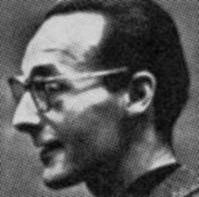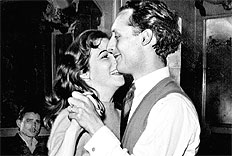2006年,法國左翼思想安德列·高茲(Andre Gorz,1923-2007)為愛妻多麗娜寫下75頁感人至深的情

安《與妻書:真愛往事》是法國左翼思想家、記者安德列·高茲(AndreGorz,1923-2007)2006年的作品。當時83歲的丈夫用充滿愛的心為82歲的妻子多麗娜寫下75頁感人至深的情書,記錄兩人愛的歷程。一年後夫妻二人共同離世。
書名與妻書:真愛往事又名LettertoD:Alovestory作者安德列·高茲出版時間2006年裝幀精裝語言法語
德列·高茲
安德列·高茲(Andre Gorz,1923-2007),法國左翼思想家、薩特的學生、《新觀察家》周刊的創始人。

1950年,高茲開始從事新聞記者工作,在政治上接近馬克思主義。作為薩特的追隨者,高茲是薩特的學生和親密戰友,1961年起擔任薩特和梅洛·龐蒂創辦的《現代》9位編委之一,1964年成為《新觀察家》周刊創始人之一。作為法國左翼知識分子的重要代表之一,高茲支持1968年“五月風暴”,主張“自下而上”地建立民眾政黨,反對資本主義統治。高茲的主要代表作包括《歷史的道德》、《勞工戰略》、《艱難的社會主義》、《改良和革命》、《向工人階級告別》等。
高茲是當代資本主義激烈批評者,而他在法國思想界的主要成就在於依據“存在主義、馬克思主義”觀點系統地論述了“新工人階級”理論和“反資本主義的結構改革”戰略。他認為,當代資本主義存在的主要問題不是物質匱乏和對工人民眾的經濟剝削,而是工人創造力在政治上和經濟管理上的異化。在他看來,現代資本主義已為“富裕的社會主義”奠定了物質基礎,不必消滅私有制,更不需要摧毀資產階級國家機器。高茲的理論曾對法國“新左派”運動和法國統一社會黨有著相當大影響。
1970年代後,高茲發表大量文章支持生態學運動,把生態學、生態危機和“政治生態學”理論納入自己的研究領域,成為當代生態哲學和生態社會學的代表人物之一。他認為,在當代西方,隨著科技發展及其套用,出現了嚴重的生態危機,要改變這種災難的狀況,唯—的出路在於停止經濟成長,改變生活方式和限制消費,並使用可再生的能源,採用分散的技術。與此同時應選擇能促進個人自主與自然協調的建立在民主的技術基礎之上的社會。在《資本主義,社會主義,生態學》一書中,他集中論述了資本主義、社會主義與生態學的關係,闡述了他對社會主義未來和生態社會主義發展道路的基本看法,主張在新的社會歷史條件下社會主義左翼與“新社會運動”的主流——生態運動結盟,反對晚期資本主義。
高茲晚期所有著作都悲觀預言,除非資本主義的經濟理性和生產邏輯獲得根本性的扭轉,否則一個針對不論階級、不論貧富的全球災難時代必將在不遠處。高茲富有想像力和創造力的生態社會主義理論在西方被稱為“烏托邦社會主義”,在1990年代有著相當大影響力。
2007年9月,高茲(AndreGorz)和妻子被友人發現在巴黎郊區家中雙雙自殺身亡,此前,其妻一直重病緾身。高茲享年84歲。
下文即是情節節選:
回憶了從多麗娜罹患腫瘤之後至2006年,高茲夫婦一起走過的日子
I'd reached the age where you ask yourself what you have done with your life ,what you would like to

到了我這個年齡的人,總是會問自己這一生是如何度過的,自己又希望這一生如何度過.我有一種感受,好像自己並沒真正地活過,好像自己總是遠遠地觀望著自己的生活,好像自己只在一個方面得到了發展,而作為一個完整的人卻顯得那么貧乏.
I remember having written that ,at the end of the day,only one thing was essential to me :to be with you , I can't imagine continuing to write,if you no longer are. you are the essential without which all the rest, no matter how important it seems to me when you are there ,loses its meaning and its importance.
我記得自己曾經寫過這樣的話:到最後,對我而言,只有一件事情是最為重要的,那就是和你在一起.我無法想像,假如你不在人世,我該如何繼續寫作,你是最為重要的,若沒有你,其他的一切-----無論當你在的時候它顯得有多么重要-----都將失去意義,變得無足輕重.
We've had dozens of vistors from every corner of the globe and I've given dozens of interviews. I surely have not lived up to the resolution made 30 years ago:to live completely atgime in the present,mindful above all of the richness that is our shared life .i'm now reliving the instants when i made that resolution with a sense of urgenly . i don't have any major work in the pipeline. i don't want" to put off living till later"--in George**ataille's phrase--any longer.
許多客人從世界各地前來造訪,我也接受過許多次訪談,我肯定沒能堅持按照,30年前的那個決定去身體力行.自在安適地過好眼前的生活,將你我共享的多彩人生作為最重要的事情來關注.現在我重溫當初我作出決定的那一時刻.深感時日催人.我手頭不再有任何重要的工作.我再不想"等以後再好好生活"--如喬治.巴塔耶說的那樣.
In Life, in Death, in Love
當愛戀注滿今生
By Ben Macintyre
譯/齊文昱
A single sheet of paper, pinned to the door for the cleaning lady, marked the moment when the French writer-philosopher André Gorz and hi**ritish-born wife Dorine reached the final chapter in their poignant love story. The note read simply: “Warn the police station. Do not go upstairs.” In the bedroom, lying side by side in bed in the pretty mansion set back from the road in the village of Vosnon, lay the bodies of André and Dorine Gorz. They had killed themselves with a drug overdose. He was 84, and she was 83. It was September 22, 2007.
他,安德列﹒高茲,法國哲學家,作家。
她,是他的英裔妻子,名叫多莉安。
當清掃女工看到房門上用圖釘釘住的單薄的紙條,她知道,男女主人公刻骨銘心的纏綿愛情已經落下最後的帷幕。
字條上字跡寥寥:“告訴警察不要上樓。”
這是一個名叫沃斯弄的村莊。與外面的道路隔開一段距離,是他們居住的雅致樓宇。臥室的床上,他們並排安臥。
他們服藥了結了一生。
那一年,他八十四,她八十三.
那一天,是2007年9月22日。
On the bedside table lay some letters, bidding friends farewell and leaving matter-of-fact instructions for their joint cremation. No further explanations were needed, for André Gorz had already written the moving epitaph for their marriage a year earlier, and published it to greater acclaim than anything else he had achieved in a lifetime of writing and thinking.
床邊的小桌上是一些信札。信中他們向友人訣別,並理性而現實地期望他們能一起火化,灰骸合於一處。此處已不需再多文字,因為早在一年前,他就曾寫下一篇感人的銘文,並且公開發表,來紀念他們的婚姻。文章大受讀者的嘉許和讚美,受歡迎的程度超過他一生思考、創作留下的任何一部作品。
Lettre à D: Histoire d’un Amour (Letter to D: A Love Story) is a 75-page love letter from an adoring husband to his ailing wife. It begins: “You’re 82 years old. You’ve shrunk six centimetres, you only weigh 45 kilos yet you’re still beautiful, graceful and desirable. We’ve lived together now for 58 years and I love you more than ever.” This simple statement of devotion and gratitude touched a chord with thousands, but the letter was really only addressed to one person, an acknowledgement that without his wife, Gorz’s work as a thinker, journalist and friend of Jean-Paul Sartre would be “meaningless and unimportant”.
這篇題為《與妻書:真愛往事》的作品,是一位心間載滿恩情的丈夫寫給羸病中的愛侶的長達七十五頁的情書。在這篇長文的開頭,他說:
“你啊,今年已經八十二歲高齡。
你的身形已不再挺拔,較之從前,甚至矮了六公分,體重也只剩下四十五公斤。
但你依然容顏美麗,風韻動人。
一起廝守著,我們至今走過五十八個春秋。
如今,我對你的愛,勝過往昔。”
平實樸素的告白,滿是至愛與感恩。萬千讀者被深深打動,儘管事實上這封情書只寫給一個人。在情書中他坦言,他的一生,儘管一直在思考,在記錄,並有幸與讓﹒保羅﹒薩特這樣名滿天下的大哲學家成為朋友,但如果沒有妻子的存在,也會變得“毫無意義,瑣碎蒼白。”
“I need to piece together the story of our love to appreciate its full meaning. It’s what has allowed us to become who we are, living through each other and for each other. I’m writing to you now to understand what my life ha**een, what our life together has meant.” When the couple met in Lausanne, Switzerland, in 1947, she was Doreen Keir, a 23-year-old British woman from a broken home travelling, somewhat aimlessly, through postwar Europe; he was still Gérard Horst, a 24-year-old Austrian of Jewish descent, without money, prospects or a country to call home. They met over a card table. Outside the window, it was snowing heavily. Later, the bashful young Austrian asked the red-haired and vivaciousEnglishwoman to dance.
“我們所共同經歷的風雨晨昏,一顰一笑,匯聚起來,便是愛情的全部真諦。 我們的愛,浸漬,塑造著你我;兩心相依,彼此是各自的依託和訴求。當我寫這些字的時候,回望走過的一生,更漸漸領悟,一路有你,生命的意義從此不同。”
1947年,他們在瑞士的琉森相遇。那時,她的名字叫多瑞恩﹒凱爾,一個23歲的英國女生。她來自一個破碎的家庭,身如蓬草,在戰後的歐洲輾轉漂泊。而他,那時的名字叫做傑勒德﹒霍爾斯,猶太血統的奧地利人。24歲的他,身無分文,前途暗淡,更不知道腳下的哪方土地是自己的故國家園。他們在打牌的時候相遇。是他主動提出邀請,於是一個生性靦腆的奧地利男子,和一位活潑開朗的英倫女生相擁而舞。
窗外,大雪飄飛。
Horst had been born in Vienna in 1923, to a Roman Catholic mother and Jewish father. It was a miserable childhood. He graduated with a degree in chemical engineering in 1945. The following year he met Sartre and Simone de Beauvoir, in Switzerland for a conference, who encouraged him to pursue his growing interest in moral philosophy. But it was the discovery of Doreen that launched Gorz’s writing career.
他,1923年出生在維也納,父親是猶太人,母親是羅馬天主教徒。童年,索然寡歡。1945年,他大學畢業了,取得化學工程專業學位。次年,在瑞士的一次會議上,他結識了薩特和西蒙娜﹒德﹒波伏瓦。兩人知道他對道德哲學的興趣愈加濃厚,於是鼓勵他繼續探求。如果說這次相識是他哲學探索之旅的開始,那么,是他與妻子的邂逅正式開啟了他的寫作生涯。
Both were essentially rootless. Doreen had been born in London, but abandoned by her mother as a child, and grew up in the care of a “godfather” in a house by the sea in England.
那時兩人都是伶仃的漂泊者。她生於倫敦,童年時被母親拋棄,後來在英國海濱的一處居所中由她的“教父”撫養長大。
“They both knew insecurity as a formative experience,” said one friend. “They fought side by side, mutually protective…she became his archivist and researcher, his interlocutor, his primary reader, his sole critic.” The couple married in September 1949, and moved to Paris. She changed her name to its French equivalent, Dorine. In the fervid ideological atmosphere of the 1950s, while awaiting his French naturalisation papers, Horst decided that it would be safer to write under a pseudonym. He became André Gorz, a peculiar backhanded tribute to the father he had never liked: Gorz was the name of the industrial town where his father’s military-issue spectacles had been manufactured.
“他們當時都有一種浸入骨髓的不安全感,”一位友人這樣說,“於是他們攜手打拚,彼此呵護,…她為他保管資料,幫他做研究,與他傾心交談,每當他有作品問世,她就是第一個讀者和唯一的評論員。”1949年9月,他們結婚了,並遷徙到巴黎。依照法語的特點,她把自己的名字改成多莉安。50年代,意識形態的氛圍瘋狂而熾烈。他加入法國國籍的要求尚未獲準。等待中,他作出一個決定:出於安全的考慮,開始用筆名寫作。於是此後他在文章上的署名變成“安德列﹒高茲”。“高茲”,是一個工業小鎮的名字。這個小鎮生產過一種眼鏡,是父親當年服役時軍隊統一發放的。儘管他從來不曾對父親有過太多好感,但這個筆名成為他對父親一種獨特而隱晦的紀念。
Many of his arguments seem modern today: an emphasis on balancing working time with other pursuits, the need for minimal universal welfare arrangements and the looming environmental threat of Globalisation. Gorz, a bitter opponent of nuclear power, was among the first to articulate a theory of ecological politics.
他的很多觀點現在看來仍不過時。比如,他強調工作之外,還應有其它人生追求,我們要懂得尋求兩者間的平衡點;他指出有必要設立公眾福利的保障性下限;他還警示我們全球化的過程帶來很多四處潛伏的環境方面的隱患。此外,他義正詞嚴地反對核武器,是“生態政治學”理念的最早提出者之一。
Gorz was an otherwordly, intellectual figure, shy and discreet, a “library-rat” in the words of one friend. Dorine as his counterpoint was very joyful, sharp, always smiling. She was his contact with the real world”. The couple decided, early in their marriage, that it would not involve having children. Gorz once told the newspaper Libération: “…If we had had children, I would have been jealous of Dorine. I preferred to have her all to myself.” In this, they were exceptional, given the tenor of their times and the social milieu they moved in. While Sartre and De Beauvoir each had a string of lovers, André and Dorine Gorz were consistently faithful, with a relationship of unquestioning trust, according to friends, physically and intellectually.
高茲生性害羞而謹慎,活在他自己的理想世界裡。朋友戲謔地說他是“一隻鑽進圖書館的老鼠”。妻子精明,樂觀,臉上總掛著笑容,是他的天性的絕好互補,代他與身邊的真實的世界應酬周鏇。婚後不久,他們便決定不準備要孩子。一次,他這樣對《解放報》的記者說,“多莉安是我的,我可不想與人分享。要是我們有了孩子,我一定會特別嫉妒。”“彼此只屬於對方”,他們的這種信條與當時的潮流以及他們所融入的圈子有些格格不入。薩特與西蒙娜﹒德﹒波伏瓦各自夜夜笙歌,緋聞不絕,但他和她,用友人的話說,卻“一如既往地坦誠忠貞,彼此的軀體和靈魂不曾有過絲毫的猜忌和動搖。”
Acolytes, student and fellow thinkers often clustered at their Paris apartment, where afternoon tea was served punctually, in the approved British manner. The Gorzes appeared to live on nothing, elegantly. “We know how to live in poverty, but not in ugliness,” Dorine would say.
他們在巴黎的寓所總是賓客如雲,這裡面有他的追隨者、弟子和思想界的同行。而且,賓客們總是能準時享用到絕對正宗的英式下午茶。在外人看來,他和她收入拮据,卻總是過著優雅精緻的生活。還是妻子的話給出了答案,
“生活,可以貧困,但不能潦倒。”
By 1968, Gorz was enjoying considerable literary success as a prominent figure in the student uprising, but by then Dorine was already unwell. In 1965 she had undergone a routine back operation which involved X-rays using the radio-opaque10) contrast agent lipiodol. The side-effects of the chemical were horrific: with particles lodged in her cranium and forming cervical cysts, Dorine suffered enormous and mounting pain.
1968年的學生運動,讓高茲和他的文章聲名鵲起。而那時,妻子的身體狀況已開始令人擔憂。1965年她按照計畫進行了背部手術,需要進行X光檢查。X光技術中需要用射線不能穿透的碘化油作對比劑,而這種化學物質會帶來可怕的副作用:粒子留存在她的顱腔中,同時還結成宮頸囊腫,巨大的病痛愈演愈烈,殘酷地煎熬著多莉安。
The couple moved out of Paris, and into a large maison in Vosnon, 80 miles east of the capital. But as Dorine aged, the pain grew worse.
於是夫婦搬出了巴黎,在巴黎東面80英里的沃斯弄一處寬敞的樓房中安頓下來。多莉安蒼老了,病痛有增無減。
In May 2006, Gorz contacted his publisher Michel Delorme, to say he had “a surprise” for him. Lettre à D had been written, “often in tears”, for Dorine alone. “We knew instantly the greatness and beauty of this work,” says Delorme.
2006年5月,高茲與他的出版商麥克﹒德勒姆取得聯繫,說要給他一個“驚喜”。這便是作者只寫給多莉安一個人的“淌著淚水完成”的《與妻書:真愛往事》。德勒姆後來回憶說,“我們當即意識到,這是一篇至真至美的偉大作品。”
André and Dorine Gorz were thrown together in the tumult of postwar Europe; they stayed together through the intellectual ferment of the 1950s and 1960s; and then they died together, concluding an intellectual pact between equals that had been sealed a lifetime before. Of all the millions of words written by Gorz, none will be remembered so long as the open, extended, heartful love letter he penned to his English wife and lover, just before the end.
“Neither of us wants to outlive the other,” he wrote. “We’ve often said to ourselves that if, by some miracle, we were to have a second life, we’d like to spend it together.”
他與她,相逢於戰後的喧囂亂世,相互依偎,走過五、六十年代的狂躁歲月,最終一起離開塵世,兌現了彼此用平等的靈魂訂立,一生的時光封存的愛的盟約。《與妻書:真愛往事》洋洋灑灑的文字中,最為令人難忘的,莫過於結尾處作者寫給自己英國妻子的坦蕩無拘而餘韻悠長的綿綿情話:
“我們都怕對方先自己而去。
那么,期待奇蹟發生,
如果真有來世,我們依然攜手。”
